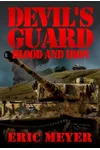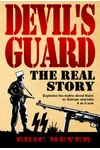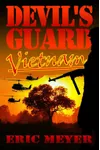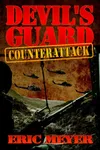Step into the gritty, pulse-pounding world of Devil’s Guard, where former Waffen-SS soldiers turned French Foreign Legionnaires battle through the jungles of Indochina! Eric Meyer’s Devil’s Guard series is a thrilling blend of military fiction and historical drama, weaving tales of redemption, survival, and moral ambiguity against the backdrop of post-World War II conflicts. With intense combat scenes and complex characters, this series hooks readers who crave action-packed stories with a thought-provoking edge.
Unlike typical war novels, Devil’s Guard dives into the lives of men with dark pasts, exploring how they navigate a new war and a chance at redemption. Meyer’s military background infuses the series with authenticity, making every firefight and strategic maneuver feel visceral and real. Ready to uncover the saga of these battle-hardened warriors? Let’s dive in!
How Devil’s Guard Began
Eric Meyer, a British novelist with a passion for military history, launched the Devil’s Guard series in 2010 with Devil’s Guard: The Real Story. Drawing on his experience in the Royal Marines Reserve and as a Special Forces instructor, Meyer crafted a series inspired by myths about ex-Nazi soldiers joining the French Foreign Legion to fight in Indochina. While rooted in historical rumors, Meyer blends fact and fiction to create a gripping narrative that feels both plausible and cinematic.
Meyer’s research into the post-WWII era and the Indochina War fueled the series’ creation. He interviewed former Legionnaires and studied the era’s geopolitical tensions, ensuring the books captured the chaos and brutality of the time. The result is a series that honors the complexity of its characters while delivering relentless action.
The Heart of Devil’s Guard
The Devil’s Guard series spans six novels, following Jurgen Hoffman, a former Waffen-SS officer, and his comrades as they fight for the French Foreign Legion and later alongside American forces. Key titles include Devil’s Guard: The Real Story, which introduces Hoffman’s journey from the Eastern Front to Indochina’s jungles, and Devil’s Guard: Vietnam, where veterans face the Viet Cong in a new war. Devil’s Guard: Blood and Iron explores Hoffman’s brutal battles at Kursk, while Devil’s Guard: Afghanistan concludes the saga in a modern conflict.
The series shines through its themes of redemption, loyalty, and the psychological toll of war. Meyer doesn’t shy away from the moral grayness of his characters—former SS soldiers seeking new identities while haunted by their pasts. The Indochina setting, with its dense jungles and relentless Viet Minh enemies, amplifies the tension, making every mission a test of survival. Meyer’s vivid prose and tactical details immerse readers in the chaos, balancing heart-pounding action with introspective moments.
While some critics note factual inaccuracies, like errors in military decorations or historical events, fans praise the series for its raw intensity and unique perspective. It’s less about historical precision and more about capturing the human cost of conflict through flawed, fascinating characters.
Why Devil’s Guard Resonates
Devil’s Guard stands out in military fiction for its bold exploration of controversial figures—ex-Nazi soldiers—without glorifying their pasts. Instead, Meyer uses their stories to probe deeper questions about redemption and the cyclical nature of war. The series’ gritty realism and focus on lesser-known conflicts like the Indochina War have earned it a dedicated niche following, especially among fans of authors like W.E.B. Griffin.
Its lasting appeal lies in its ability to blend historical intrigue with universal themes. Readers are drawn to the moral dilemmas and the raw, unfiltered depiction of combat, which feels both timeless and relevant. For those fascinated by the human side of war, Devil’s Guard remains a compelling, if polarizing, read.
- First Published: 2010
- Number of Books: 6
- Genres: Military Fiction, Historical Fiction
Grab Devil’s Guard: The Real Story and dive into a world of high-stakes battles and haunting redemption arcs. The jungles of Indochina are calling—will you answer?





